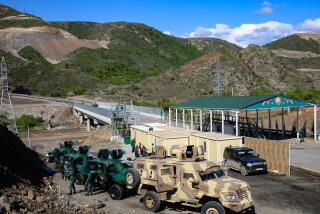Gorbachev Subtlety Catches U.S. Asleep on Afghanistan
- Share via
After seven years of war, Moscow is now talking peace in Afghanistan. The Soviet foreign minister, Eduard A. Shevardnadze, has visited Kabul and hinted that some Soviet troops, now numbering 120,000, will soon go home. This is sweetening for a proposed six-month cease-fire and talks between the rebel moujahedeen (“holy warriors”) and the puppet government of Najib. These talks would be designed to produce a national unity government, an end to outside support for the moujahedeen and then departure of Soviet forces.
Is this a trick, or is Mikhail S. Gorbachev trying to gain a breathing space so that he can reform the Soviet economy? The answer to both questions probably is yes . In any event it is risky to believe that the Soviets are turning tail out of weakness. And the West has high stakes in whatever happens.
It is tempting to see the new Soviet overtures as simply fatigue with the war, as though Afghanistan were Moscow’s Vietnam. It is not. Not only does the Soviet Union have the military benefits of proximity, but it cannot and will not risk defeat along its southern border.
If Gorbachev wants out, it will be on his terms and must confer some advantage. Most important for Moscow, Afghanistan must not become a source of threat to the Soviet Union. Without a government in Kabul that is both friendly and firmly entrenched, that result cannot be guaranteed. It could be aided, however, if Pakistan would seal its border, through which most outside aid to the moujahedeen now passes. In part, therefore, Gorbachev’s new diplomacy is directed toward talks next month, under U.N. auspices, between the Afghan and Pakistani governments.
The Soviets have a further stake in the nature of the Afghan regime. They invaded in December, 1979, to protect communist rule that was under challenge. Had they not done so, they would have jeopardized the Brezhnev Doctrine. This was the commitment, first made during the invasion of Czechoslovakia in 1968, that the Soviet Union would protect the gains of socialism. Thus if Soviet troops leave Afghanistan and the communist regime is then deposed, the shock will be felt as far away as Eastern Europe and even in the Soviet Asian republics.
The moujahedeen have offered to talk directly with the Soviets, bypassing the Kabul government. For Moscow, this underlines the difficulty of preserving a friendly regime after the troops are gone. It adds to skepticism about how far Gorbachev will go to reduce costs to the Soviets.
Yet a Soviet peace policy also would pay dividends. At the tactical level, Moscow is wooing Iran, especially now that the United States has had to pull back because its trading of arms for hostages was exposed. If successful, Moscow will try to get Iran to end its support of Afghan rebels--an important but little-reported factor in the struggle--and accept a compromise solution. Pakistan would then be under extreme pressure to follow suit.
Gorbachev also has his eye on a broader canvas. Last July in Vladivostok he outlined his views on East Asian security, including “a Pacific conference . . . with the participation of all countries having a relationship with the ocean.” His diplomatic offensive focuses on warming relations with Japan and reducing tensions with China. In fact, Soviet military withdrawal from Afghanistan is one of China’s conditions for improving relations.
The Soviets have sent a further warning to Pakistan by supplying India with first-rank MIG aircraft. And they have made overtures to the Assn. of South East Asian Nations and accepted the South Pacific nuclear-free zone. This last step is a pointed contrast to Washington’s severing of its alliance with New Zealand because it will not tolerate visits by vessels that might be carrying nuclear weapons.
Viewed against this picture of Soviet diplomatic activity, the United States seems to have a one-dimensional policy toward events linked to Afghanistan. The United States is widely speculated to be supplying the moujahedeen with weapons while offering to see Afghanistan returned to its classic role as a buffer state, provided the Soviets will withdraw. If the Soviets will not leave, at least they will be made to pay a substantial price.
Yet there is no apparent U.S. policy for circumstances in which the Soviets succeed in extricating themselves while keeping a friendly government in Kabul. We have become so used to heavy-handed Soviet policy in Asia that Gorbachev’s new subtlety has caught Washington napping and unprepared, so far, to match Soviet diplomacy. For years, for example, Soviet troops in Afghanistan seemed to pose a threat to Iran and its transformation into the new buffer state. Yet peace in Afghanistan could provide Moscow with an even better chance to cultivate Iran while nibbling at the U.S. position elsewhere in Asia.
Thus, whatever Gorbachev’s motives for the Afghan peace overture may be, the United States cannot continue to sleepwalk its way through Southwest Asia and environs. The historic Great Game in Asia continues, but the United States is hardly playing the Western part. Youth and vigor in the Kremlin are challenging the notion that there is no price to be paid for American neglect.
More to Read
Sign up for Essential California
The most important California stories and recommendations in your inbox every morning.
You may occasionally receive promotional content from the Los Angeles Times.












